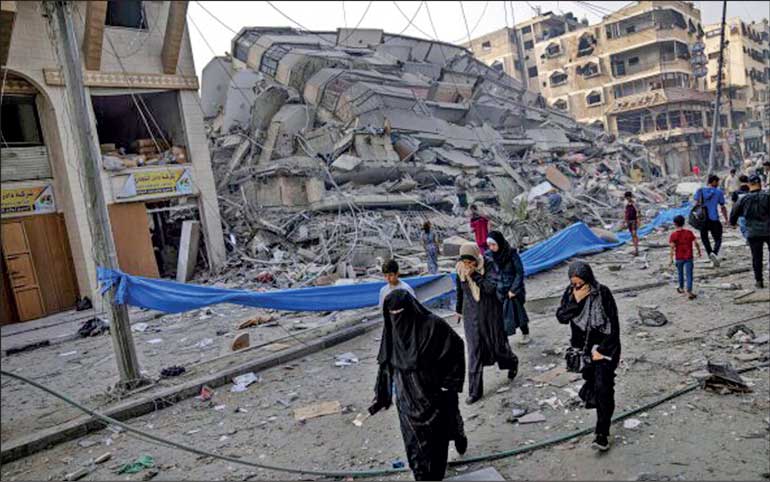Thursday Feb 19, 2026
Thursday Feb 19, 2026
Wednesday, 24 April 2024 00:30 - - {{hitsCtrl.values.hits}}

The core problem, the Gaza war continues to shock and anger the world community, which is why world perspectives are shifting
 Gaza war on 200th day, today
Gaza war on 200th day, today Two hundred days after it began last 7 October, the terrible, system-shaking, Gaza war, is now a whole West Asian regional crisis. The very prolongation of the military onslaught on Gaza and the violence in the West Bank as well as its highly controversial and socially devastating nature has very quickly expanded it beyond Israel-Palestine’s borders. Given the current global systemic intimacy, it is actually a global crisis.
Today, we, in Sri Lanka, are directly affected by the West Asian war crisis that the Gaza war has become. Leave aside the simple danger of long-range missile mis-targeting in our neighbouring region of West Asia. Long range missiles possessed by some of the combatant states, carrying nuclear payloads, can, with a possible targeting failure, easily come in Sri Lanka’s direction.
Can readers guess the immediate blast (shock wave) and firestorm radius of a 5-kiloton nuclear warhead? And what about the subsequent toxic ‘fall-out’ of dust and fumes? Fall-out spreads with the wind and has a fall radius of four to five times the geophysical footprint of the blast itself. Scarier, is the duration of the lethal toxicity of the fall-out – radioactive Plutonium 239, for example, takes 24,000 years to lose its lethal effects.
The danger of direct military impact is only one – thankfully, remote – possibility.
Aside from such nightmarish speculation, there is a long list of other already impacting ramifications of the prolonged and expanding West Asian conflagration.
That the expansion of the military conflict was inevitable had been warned by many, if not most, analysts long before that basically amateurish, small-scale, (but still effective) assault by Gaza’s combined Occupation resistance movements against Israeli siege lines on 7 October. That that single assault, lasting less than a day (given its tiny scale), has led to the world-shaking crisis we are in today says much about the original domestic political nature of Israel-Palestine as well as the profound intimacy of our global system today.
Not simply an “internal” conflict
The very nature of the politico-military problem that is Palestine-Israel (or, Israel-Palestine, depending on one’s political interests) is inherently regional and not simply an “internal” conflict. In the first place, the state of Israel was set up, nay, imposed, from outside its current state territory and not by an indigenous society. It was set up by foreign, indeed, extra-regional states and governments and, by waves of foreign settlers.
From the very outset, from 1948 (and before) that is, foreign states used their military, political and diplomatic (the early UN) power to create the Israeli state and have had to remain as intimately involved power brokers and military actors to ensure that state’s survival. The very same Western power bloc (that still dominates the world to a large degree) that established the state of Israel still remains as the main military bloc complicit in its continued
enforcement of that statehood.
The evidence of that ‘enforcement’ is stark: not just in the long record of annual Western military and economic aid to Israel over the past 75 years of its existence but in the $ 26 billion latest arms ammunition re-supply extended by Washington alone just two days ago. Even starker is the veto cast last week by the United States of America in the UN Security Council to block, yet again, the UN’s acceptance of membership of the state of Palestine.
Extra-regional involvement
This extra-regional involvement – and complicity – of global geopolitical forces with the local context explains the spread of the impact of the internal conflict from within Israel-Palestine across the region and across the world.
At the first level of this impact, the conflict within Israel-Palestine has involved the immediately neighbouring states from the outset – for 75 years. Why? The ethnic cleansing of the indigenous Palestinian population from its homeland to make way for European Jewish Israel pushed millions of displaced refugees into ‘temporary’ camps in all the neighbouring states. And they remain there as generations of stateless, unemployed, frustrated, aspiring people – for the last 75 years.
At the second level, the changing power balances in the larger West Asian region, over that same 75 years, again, partly due to the interventions by those same extra-regional allies of Israel, the Western power bloc (i.e. NATO+EU), has resulted in a changed geopolitical landscape today. The festering refugee situation and related wars, has spawned powerful, non-governmental, militias across West Asia.
Larger states in West Asia, notably Iran and Iraq have changed in nature and have become ambitious actors, naturally, legitimately, anxious to ensure their influence in their own neighbourhood. Hence the new network of Iran and Iraq supported Arab militias.
Thus, today, we see the expansion of the war across West Asia region. The Houthis are not immediate neighbours of Palestine but empathise as part of the larger Arab community.
Next, we see how the geopolitical pressures exerted by Israel’s extra-regional Western allies have alienated some West Asian states and popular militant movements. Some of these states are distancing themselves from the West and are entering into new, non-Western geopolitical networks like BRICS.
West Asia’s crucial role as the largest single energy supplying region
Most significant, however, is an even bigger ramification that affects the entire world: West Asia’s crucial role as the largest single energy supplying region. This energy is critical to both the West as well as the newly emergent economic power blocs and states – China, India, and the new BRICS, Shanghai Co-operation Organisation (CSO) among others.
Already, the volatile oil prices are generally affecting the world economic health, especially the economies of the vast number of poorer states. Simultaneously, the millions of Third World migrant workers now in West Asia face uncertainty for their livelihoods and, in turn, their home economies face uncertainty. Sri Lanka is directly affected by both the energy supply problems and the migrant worker predicament.
All these factors and, their path of historical maturing, points to new world social perspectives as well as global geopolitical realignments. The “free world” is now a bad word. The West’s munificence is either rejected or at least doubted.
The core problem, the Gaza war continues to shock and anger the world community, which is why world perspectives are shifting. This ideological shift further grounds the geopolitical shifts in the world order. In fact, it is too late to stop this re-shaping. The horrors of Gaza have gone on long enough. And the centrality of West Asia to the world community is decisive.